Negative Externalities: Market Failures and Government Intervention
VerifiedAdded on 2020/02/24
|7
|1232
|42
Essay
AI Summary
This essay delves into the concept of negative externalities, defining them as costs borne by third parties not involved in an economic transaction. It explores how these externalities lead to market failures due to the absence of property rights or the failure to account for social costs in production calculations. The essay provides examples, such as pollution from companies, and discusses the need for government intervention through regulations, subsidies, and taxation to address inefficiencies. It examines the impact of negative externalities on market efficiency, comparing outcomes in perfectly competitive markets and monopolies. A case study of Kathmandu, Nepal, and its squatter settlements highlights the challenges and government strategies, such as the "enabling" approach, used to mitigate negative externalities. The essay concludes by emphasizing the importance of government intervention in promoting fairness and correcting market imbalances caused by negative externalities.
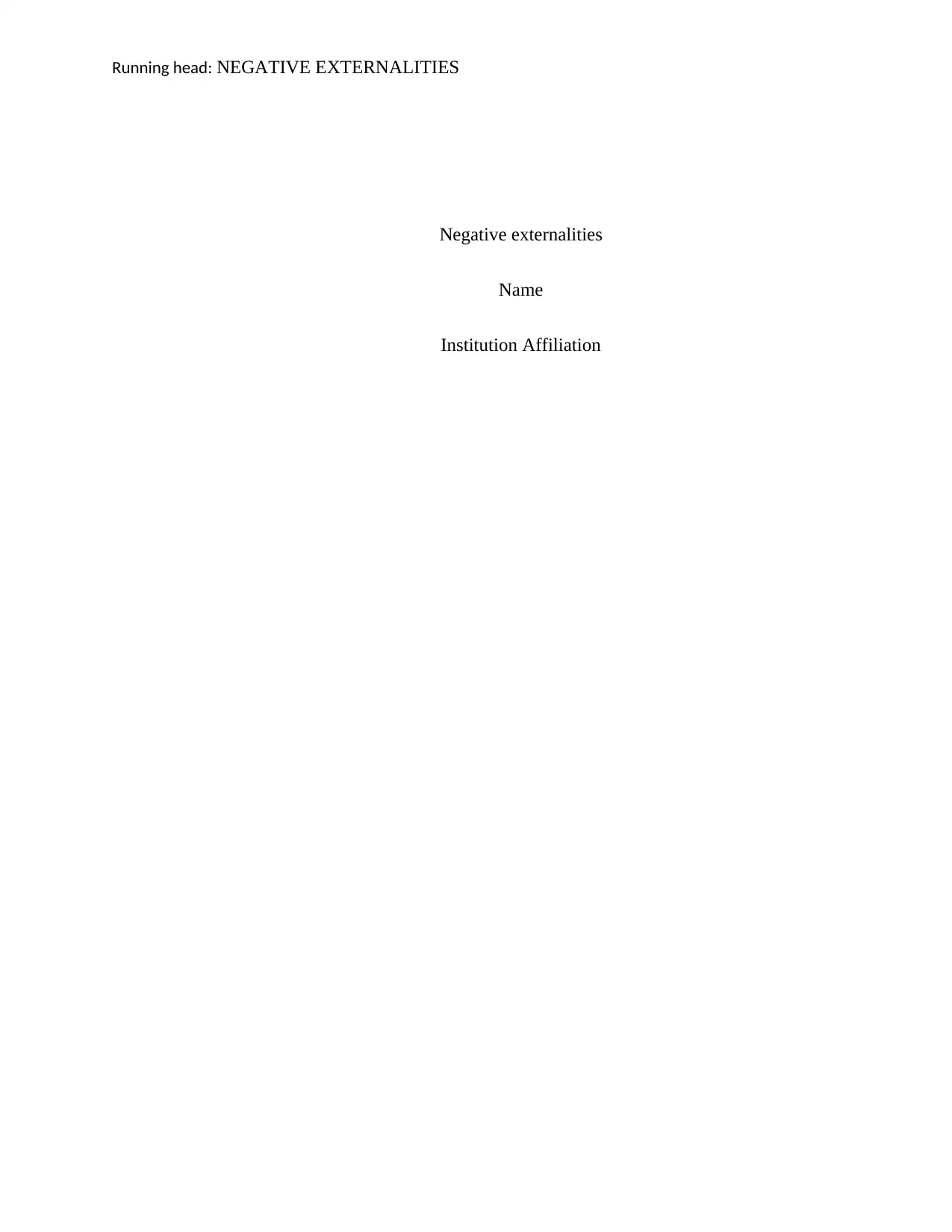
Running head: NEGATIVE EXTERNALITIES
Negative externalities
Name
Institution Affiliation
Negative externalities
Name
Institution Affiliation
Paraphrase This Document
Need a fresh take? Get an instant paraphrase of this document with our AI Paraphraser
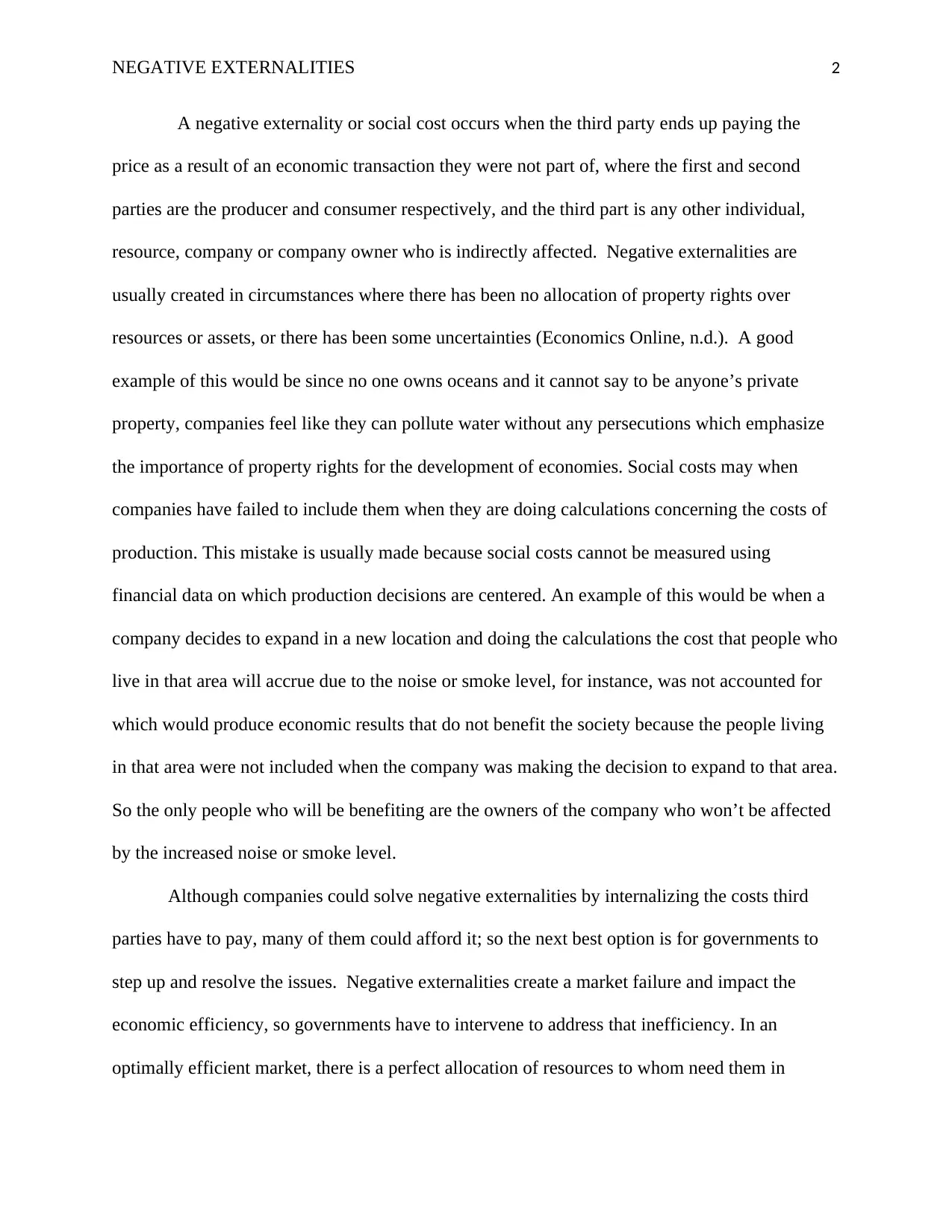
NEGATIVE EXTERNALITIES 2
A negative externality or social cost occurs when the third party ends up paying the
price as a result of an economic transaction they were not part of, where the first and second
parties are the producer and consumer respectively, and the third part is any other individual,
resource, company or company owner who is indirectly affected. Negative externalities are
usually created in circumstances where there has been no allocation of property rights over
resources or assets, or there has been some uncertainties (Economics Online, n.d.). A good
example of this would be since no one owns oceans and it cannot say to be anyone’s private
property, companies feel like they can pollute water without any persecutions which emphasize
the importance of property rights for the development of economies. Social costs may when
companies have failed to include them when they are doing calculations concerning the costs of
production. This mistake is usually made because social costs cannot be measured using
financial data on which production decisions are centered. An example of this would be when a
company decides to expand in a new location and doing the calculations the cost that people who
live in that area will accrue due to the noise or smoke level, for instance, was not accounted for
which would produce economic results that do not benefit the society because the people living
in that area were not included when the company was making the decision to expand to that area.
So the only people who will be benefiting are the owners of the company who won’t be affected
by the increased noise or smoke level.
Although companies could solve negative externalities by internalizing the costs third
parties have to pay, many of them could afford it; so the next best option is for governments to
step up and resolve the issues. Negative externalities create a market failure and impact the
economic efficiency, so governments have to intervene to address that inefficiency. In an
optimally efficient market, there is a perfect allocation of resources to whom need them in
A negative externality or social cost occurs when the third party ends up paying the
price as a result of an economic transaction they were not part of, where the first and second
parties are the producer and consumer respectively, and the third part is any other individual,
resource, company or company owner who is indirectly affected. Negative externalities are
usually created in circumstances where there has been no allocation of property rights over
resources or assets, or there has been some uncertainties (Economics Online, n.d.). A good
example of this would be since no one owns oceans and it cannot say to be anyone’s private
property, companies feel like they can pollute water without any persecutions which emphasize
the importance of property rights for the development of economies. Social costs may when
companies have failed to include them when they are doing calculations concerning the costs of
production. This mistake is usually made because social costs cannot be measured using
financial data on which production decisions are centered. An example of this would be when a
company decides to expand in a new location and doing the calculations the cost that people who
live in that area will accrue due to the noise or smoke level, for instance, was not accounted for
which would produce economic results that do not benefit the society because the people living
in that area were not included when the company was making the decision to expand to that area.
So the only people who will be benefiting are the owners of the company who won’t be affected
by the increased noise or smoke level.
Although companies could solve negative externalities by internalizing the costs third
parties have to pay, many of them could afford it; so the next best option is for governments to
step up and resolve the issues. Negative externalities create a market failure and impact the
economic efficiency, so governments have to intervene to address that inefficiency. In an
optimally efficient market, there is a perfect allocation of resources to whom need them in
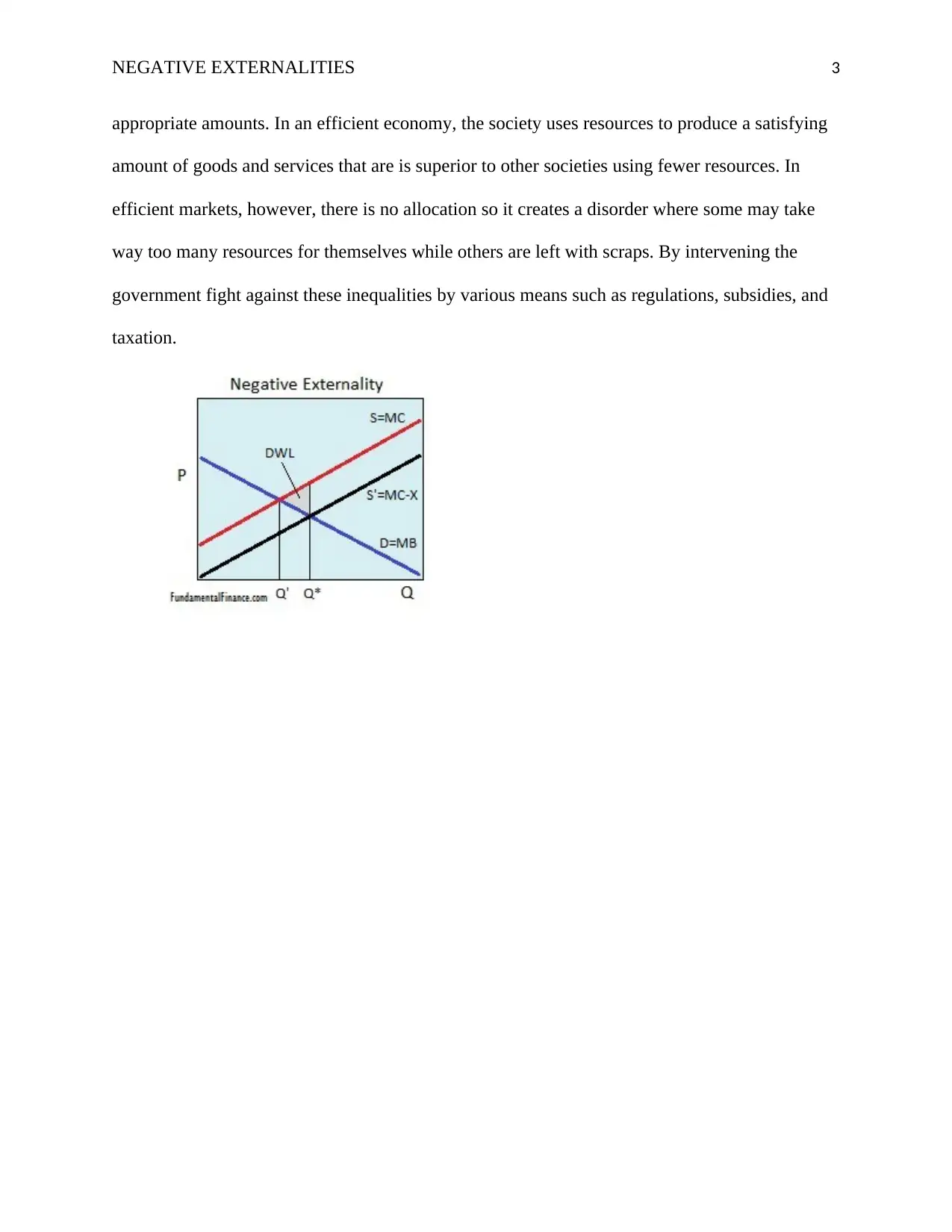
NEGATIVE EXTERNALITIES 3
appropriate amounts. In an efficient economy, the society uses resources to produce a satisfying
amount of goods and services that are is superior to other societies using fewer resources. In
efficient markets, however, there is no allocation so it creates a disorder where some may take
way too many resources for themselves while others are left with scraps. By intervening the
government fight against these inequalities by various means such as regulations, subsidies, and
taxation.
appropriate amounts. In an efficient economy, the society uses resources to produce a satisfying
amount of goods and services that are is superior to other societies using fewer resources. In
efficient markets, however, there is no allocation so it creates a disorder where some may take
way too many resources for themselves while others are left with scraps. By intervening the
government fight against these inequalities by various means such as regulations, subsidies, and
taxation.
⊘ This is a preview!⊘
Do you want full access?
Subscribe today to unlock all pages.

Trusted by 1+ million students worldwide
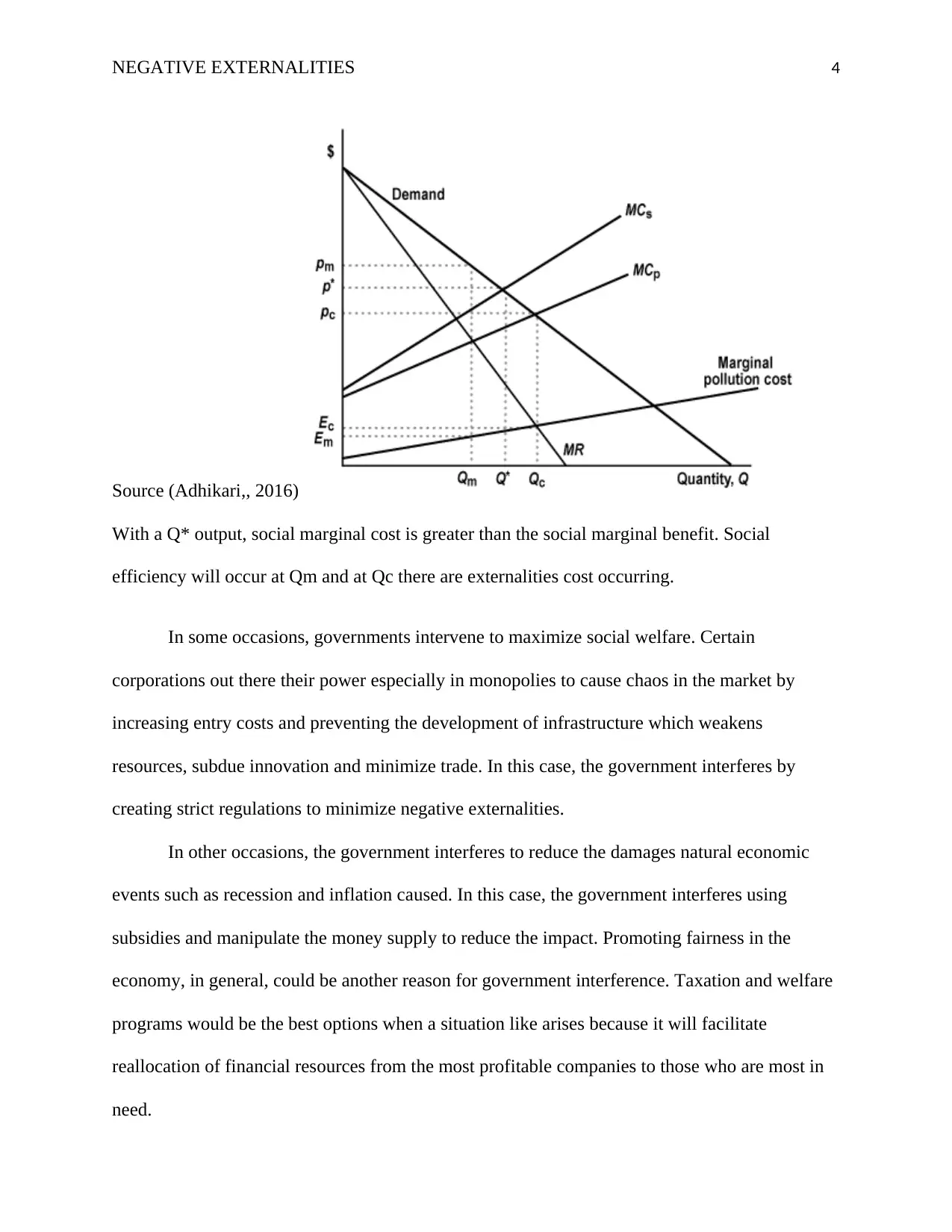
NEGATIVE EXTERNALITIES 4
Source (Adhikari,, 2016)
With a Q* output, social marginal cost is greater than the social marginal benefit. Social
efficiency will occur at Qm and at Qc there are externalities cost occurring.
In some occasions, governments intervene to maximize social welfare. Certain
corporations out there their power especially in monopolies to cause chaos in the market by
increasing entry costs and preventing the development of infrastructure which weakens
resources, subdue innovation and minimize trade. In this case, the government interferes by
creating strict regulations to minimize negative externalities.
In other occasions, the government interferes to reduce the damages natural economic
events such as recession and inflation caused. In this case, the government interferes using
subsidies and manipulate the money supply to reduce the impact. Promoting fairness in the
economy, in general, could be another reason for government interference. Taxation and welfare
programs would be the best options when a situation like arises because it will facilitate
reallocation of financial resources from the most profitable companies to those who are most in
need.
Source (Adhikari,, 2016)
With a Q* output, social marginal cost is greater than the social marginal benefit. Social
efficiency will occur at Qm and at Qc there are externalities cost occurring.
In some occasions, governments intervene to maximize social welfare. Certain
corporations out there their power especially in monopolies to cause chaos in the market by
increasing entry costs and preventing the development of infrastructure which weakens
resources, subdue innovation and minimize trade. In this case, the government interferes by
creating strict regulations to minimize negative externalities.
In other occasions, the government interferes to reduce the damages natural economic
events such as recession and inflation caused. In this case, the government interferes using
subsidies and manipulate the money supply to reduce the impact. Promoting fairness in the
economy, in general, could be another reason for government interference. Taxation and welfare
programs would be the best options when a situation like arises because it will facilitate
reallocation of financial resources from the most profitable companies to those who are most in
need.
Paraphrase This Document
Need a fresh take? Get an instant paraphrase of this document with our AI Paraphraser
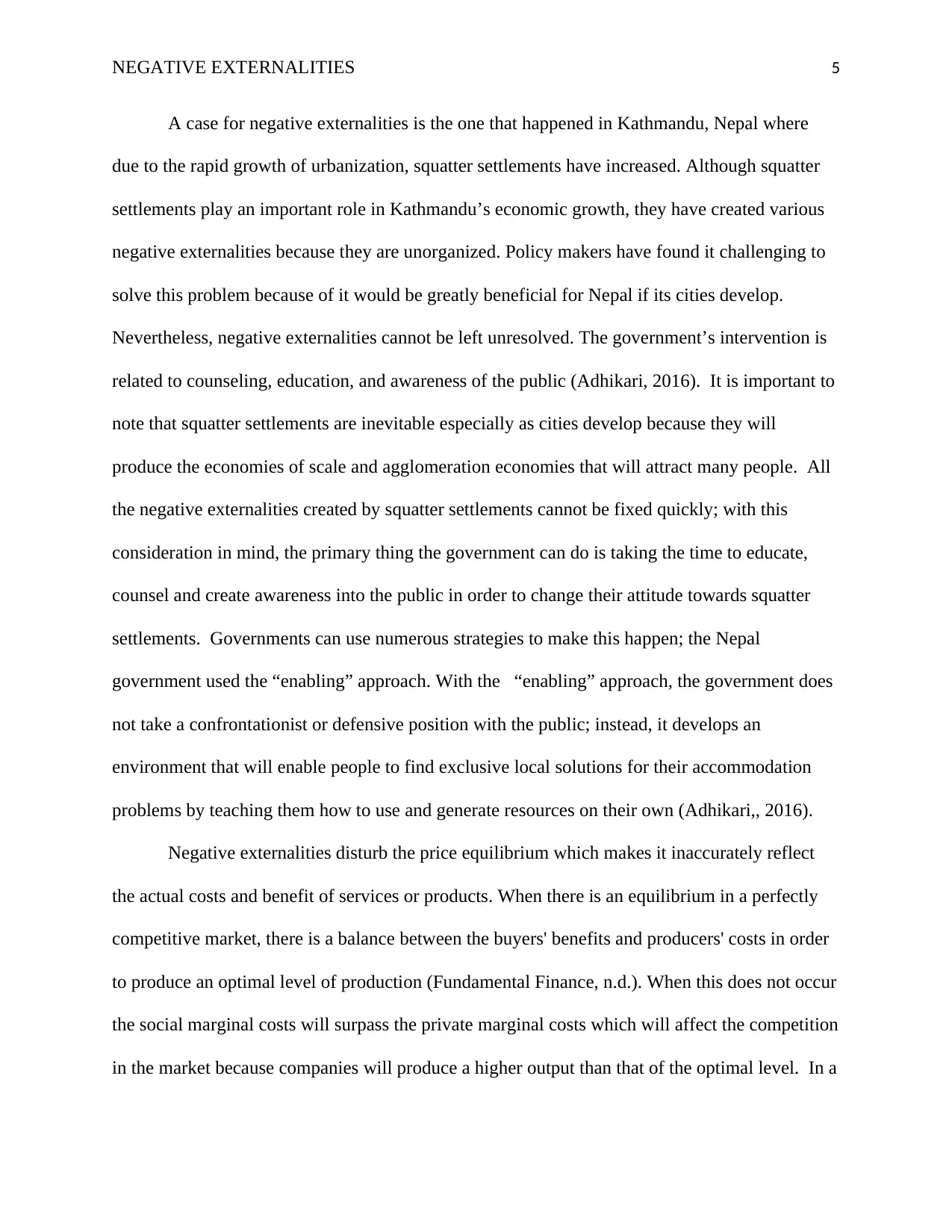
NEGATIVE EXTERNALITIES 5
A case for negative externalities is the one that happened in Kathmandu, Nepal where
due to the rapid growth of urbanization, squatter settlements have increased. Although squatter
settlements play an important role in Kathmandu’s economic growth, they have created various
negative externalities because they are unorganized. Policy makers have found it challenging to
solve this problem because of it would be greatly beneficial for Nepal if its cities develop.
Nevertheless, negative externalities cannot be left unresolved. The government’s intervention is
related to counseling, education, and awareness of the public (Adhikari, 2016). It is important to
note that squatter settlements are inevitable especially as cities develop because they will
produce the economies of scale and agglomeration economies that will attract many people. All
the negative externalities created by squatter settlements cannot be fixed quickly; with this
consideration in mind, the primary thing the government can do is taking the time to educate,
counsel and create awareness into the public in order to change their attitude towards squatter
settlements. Governments can use numerous strategies to make this happen; the Nepal
government used the “enabling” approach. With the “enabling” approach, the government does
not take a confrontationist or defensive position with the public; instead, it develops an
environment that will enable people to find exclusive local solutions for their accommodation
problems by teaching them how to use and generate resources on their own (Adhikari,, 2016).
Negative externalities disturb the price equilibrium which makes it inaccurately reflect
the actual costs and benefit of services or products. When there is an equilibrium in a perfectly
competitive market, there is a balance between the buyers' benefits and producers' costs in order
to produce an optimal level of production (Fundamental Finance, n.d.). When this does not occur
the social marginal costs will surpass the private marginal costs which will affect the competition
in the market because companies will produce a higher output than that of the optimal level. In a
A case for negative externalities is the one that happened in Kathmandu, Nepal where
due to the rapid growth of urbanization, squatter settlements have increased. Although squatter
settlements play an important role in Kathmandu’s economic growth, they have created various
negative externalities because they are unorganized. Policy makers have found it challenging to
solve this problem because of it would be greatly beneficial for Nepal if its cities develop.
Nevertheless, negative externalities cannot be left unresolved. The government’s intervention is
related to counseling, education, and awareness of the public (Adhikari, 2016). It is important to
note that squatter settlements are inevitable especially as cities develop because they will
produce the economies of scale and agglomeration economies that will attract many people. All
the negative externalities created by squatter settlements cannot be fixed quickly; with this
consideration in mind, the primary thing the government can do is taking the time to educate,
counsel and create awareness into the public in order to change their attitude towards squatter
settlements. Governments can use numerous strategies to make this happen; the Nepal
government used the “enabling” approach. With the “enabling” approach, the government does
not take a confrontationist or defensive position with the public; instead, it develops an
environment that will enable people to find exclusive local solutions for their accommodation
problems by teaching them how to use and generate resources on their own (Adhikari,, 2016).
Negative externalities disturb the price equilibrium which makes it inaccurately reflect
the actual costs and benefit of services or products. When there is an equilibrium in a perfectly
competitive market, there is a balance between the buyers' benefits and producers' costs in order
to produce an optimal level of production (Fundamental Finance, n.d.). When this does not occur
the social marginal costs will surpass the private marginal costs which will affect the competition
in the market because companies will produce a higher output than that of the optimal level. In a
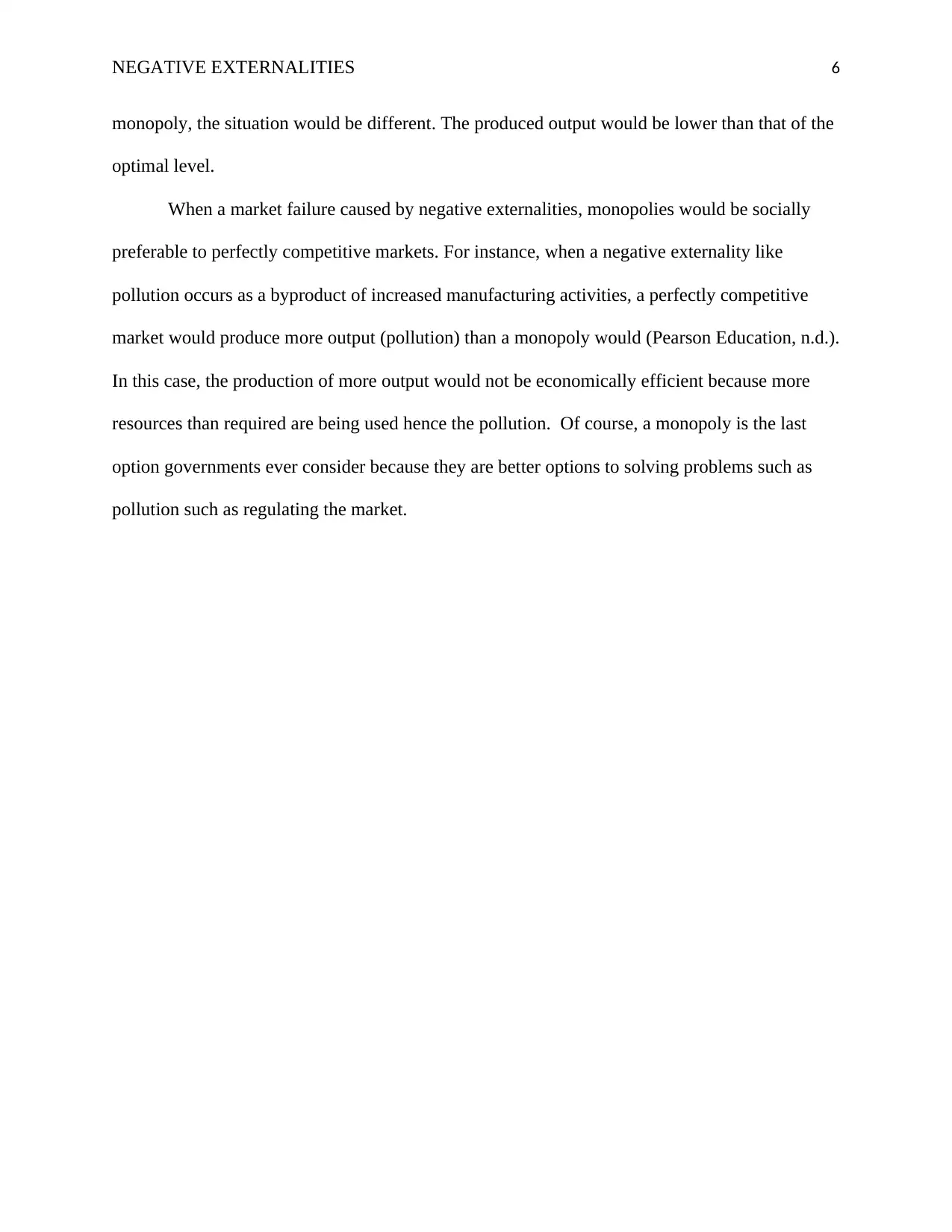
NEGATIVE EXTERNALITIES 6
monopoly, the situation would be different. The produced output would be lower than that of the
optimal level.
When a market failure caused by negative externalities, monopolies would be socially
preferable to perfectly competitive markets. For instance, when a negative externality like
pollution occurs as a byproduct of increased manufacturing activities, a perfectly competitive
market would produce more output (pollution) than a monopoly would (Pearson Education, n.d.).
In this case, the production of more output would not be economically efficient because more
resources than required are being used hence the pollution. Of course, a monopoly is the last
option governments ever consider because they are better options to solving problems such as
pollution such as regulating the market.
monopoly, the situation would be different. The produced output would be lower than that of the
optimal level.
When a market failure caused by negative externalities, monopolies would be socially
preferable to perfectly competitive markets. For instance, when a negative externality like
pollution occurs as a byproduct of increased manufacturing activities, a perfectly competitive
market would produce more output (pollution) than a monopoly would (Pearson Education, n.d.).
In this case, the production of more output would not be economically efficient because more
resources than required are being used hence the pollution. Of course, a monopoly is the last
option governments ever consider because they are better options to solving problems such as
pollution such as regulating the market.
⊘ This is a preview!⊘
Do you want full access?
Subscribe today to unlock all pages.

Trusted by 1+ million students worldwide
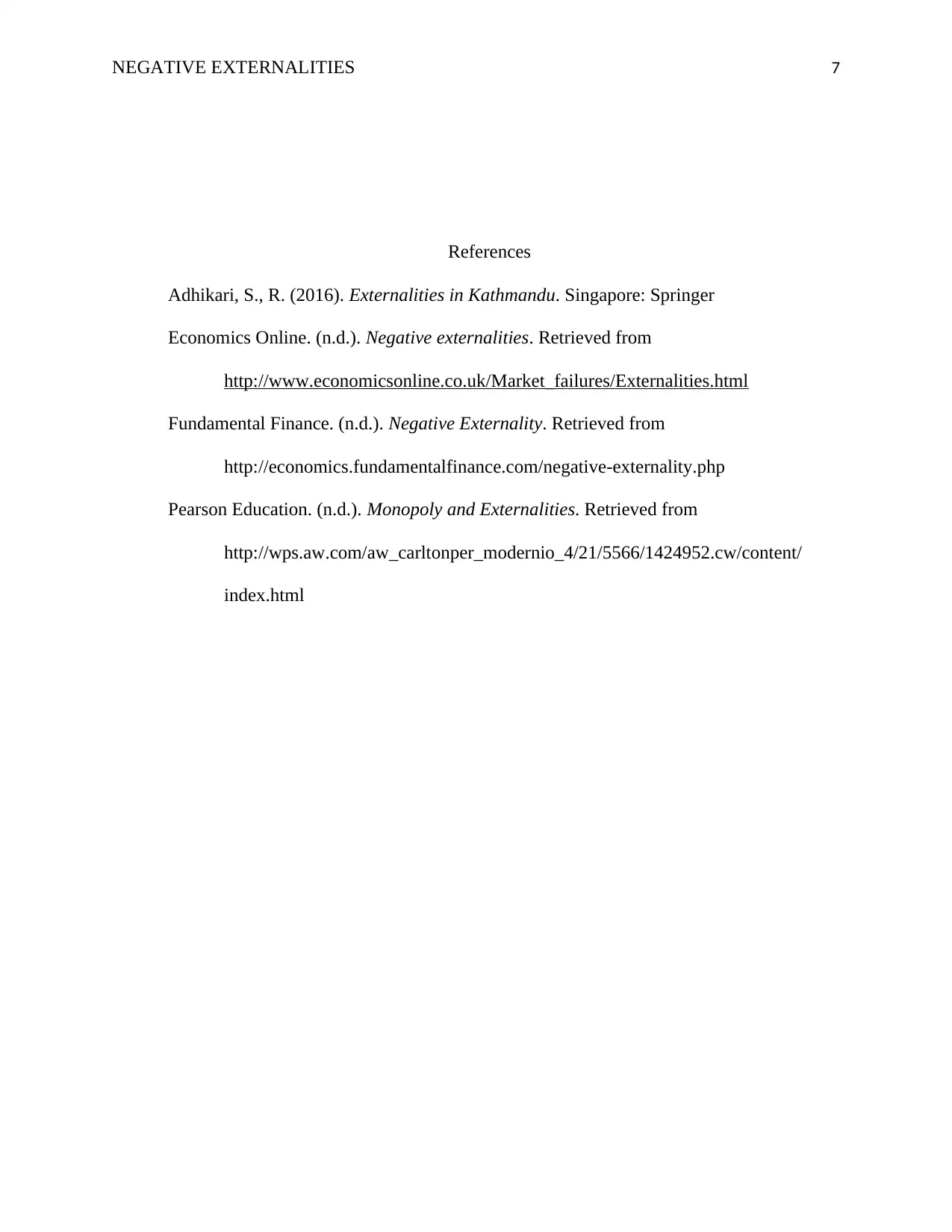
NEGATIVE EXTERNALITIES 7
References
Adhikari, S., R. (2016). Externalities in Kathmandu. Singapore: Springer
Economics Online. (n.d.). Negative externalities. Retrieved from
http://www.economicsonline.co.uk/Market_failures/Externalities.html
Fundamental Finance. (n.d.). Negative Externality. Retrieved from
http://economics.fundamentalfinance.com/negative-externality.php
Pearson Education. (n.d.). Monopoly and Externalities. Retrieved from
http://wps.aw.com/aw_carltonper_modernio_4/21/5566/1424952.cw/content/
index.html
References
Adhikari, S., R. (2016). Externalities in Kathmandu. Singapore: Springer
Economics Online. (n.d.). Negative externalities. Retrieved from
http://www.economicsonline.co.uk/Market_failures/Externalities.html
Fundamental Finance. (n.d.). Negative Externality. Retrieved from
http://economics.fundamentalfinance.com/negative-externality.php
Pearson Education. (n.d.). Monopoly and Externalities. Retrieved from
http://wps.aw.com/aw_carltonper_modernio_4/21/5566/1424952.cw/content/
index.html
1 out of 7
Related Documents
Your All-in-One AI-Powered Toolkit for Academic Success.
+13062052269
info@desklib.com
Available 24*7 on WhatsApp / Email
![[object Object]](/_next/static/media/star-bottom.7253800d.svg)
Unlock your academic potential
Copyright © 2020–2026 A2Z Services. All Rights Reserved. Developed and managed by ZUCOL.





